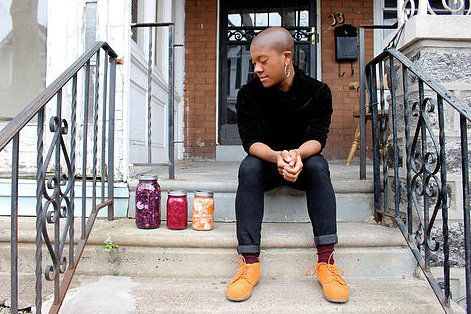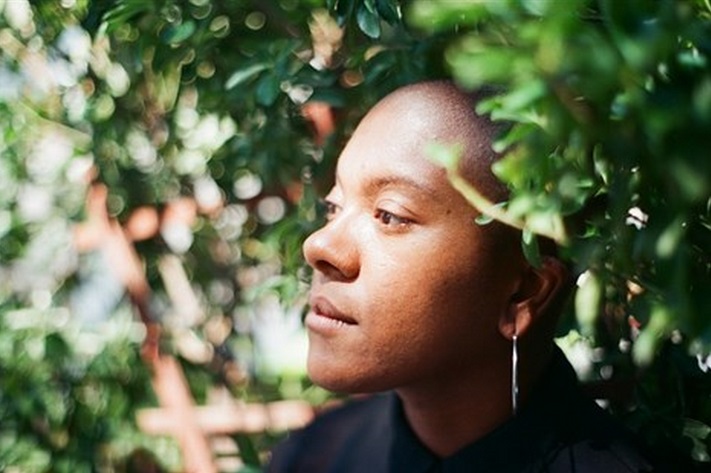
Lauren Nixon is a Food and Wellness Educator who guides people in cultivating spirit-filled lives through self-care practices and real, healthy food. She writes about healthy food for BlackGirlinOm. Her writing has also appeared in MindBodyGreen, Elephant Journal, Cooking Light Magazine’s Simmer, Boil Blog and others.
I spoke to Lauren during a time of exciting transition—she’d just finished up a job in Philadelphia that week, and was preparing to move to Washington, D.C. I remembered that D.C. was the city in which Lauren aimed to live and work; location is very important to her. Lauren is a person who truly inhabits where she lives—she bikes through cities, gardens in them and shares food with those around her. I talked to her about creative process and the influence of place.
Would you say that writing is your preferred creative outlet? If not, what is?
I use writing as a vehicle to talk about my heart work, which is cooking and fermenting. Those are my creative outlets. Because you can’t invite every single person in the world into your kitchen, writing is the best way to reveal all of the amazing things that can happen there. So, they work together.
What other venues do you have for creative expression? It sounds like cooking, gardening and farming are very strong in your life.
Nature provides a lot of really interesting creative outlets. My interest in herbs is really great because I know how to dye fabric using turmeric, or nettle. I can create medicine. I use my hands—something that I have to do when I interact with nature.
It’s one thing to take a hike, which is a great physical and spiritual practice, but it’s another thing to take something from nature and bring it back indoors, and then create something that’s a little bit longer-lasting and more spirit-inducing.
Do you think cooking, or gardening, is a creative act? Or is it more of a necessary act?
Both. Cooking and gardening are necessary. But we are told so much that things happen a certain way, and gardeners and home cooks can think outside of that box.
When I have students and we have access to farm-fresh produce, first we talk about the flavor profiles: sweet, salty, sour and bitter. I once asked them to make a stir-fry out of those four flavor profiles. It was so interesting to watch them scramble to come up with things, because in their minds only certain things go in stir fry. Carrots go in stir fry. Onions go in stir fry. Those are things they’ve seen. But food allows for a lot of creativity!
When we think about high school, or public school students in particular, there is a Right or Wrong. When you circle B and the answer is C, you get a lower mark. But in terms of your own taste buds, there isn’t a right or wrong. You like what you like, and there’s a lot of room for experimentation.
That’s why cooking and gardening and farming and creating are necessary. How the heck are you going to know what you like or don’t like, how will you know who you are, if you’re not constantly experimenting and playing? And breaking rules? And getting things wrong? And making tons of mistakes? And having tons of do-overs?
And as I remember, you don’t refer to recipes.
Never!
I just reread some of your recent publications. In a piece about ritual, you talked about “creating a space for self-care.” Do you see this as a physical space? Mental? Spiritual?
It’s a combination of both. I think that the world that we live in really, really glorifies busyness. If you’re not constantly moving, you are not valid and your presence isn’t worthy. I think that creating a physical space as well as a mental space is really important in self-care, in order to remove yourself from the epidemic of busyness.
I have to remove myself as an introvert, as well as someone who is not interested in constantly being busy. I can’t maintain that—I will fizzle out. I have to create a physical space. My physical space can be in my bedroom—create a small space, like an altar. It might be in nature. I often go to nature because the party animals and the people who want to be on their phones all day, and the people who live that busy-busy-busy life are probably not going to be on a hike. Bless them on their journey, but I need to get away from all of that.
For me, creating a physical space is a lot easier. To say, OK I’m going to make this space, I’m going to go there every single day, I’m going to go on a hike, I’m going to go to the river, I’m going to go climb a mountain—wherever your space is. Creating a mental space is a process! It’s one that I certainly haven’t mastered, and I don’t think that anyone will ever master it, or was meant to master it.
Mental space, for me—as someone who is an extreme introvert (yet still a vocal person)—means I have to journal a lot, to be able to survive in the world, and communicate effectively in the world. I have to read a lot. Getting out of my own mental space and getting into other people’s mental spaces is really important. Being really immersed in a narrator or protagonist’s words is really important in order for me to create a balanced mental space that is not self-focused all the time.

Is there a physical place you go to unleash more creativity? Or meditate?
Gardens are a great space. I don’t have my own personal garden, but I’m really lucky to have tons of people who just give me the keys to their garden, because I, a willing volunteer, will go and work on weekends! That’s what I did this morning, I volunteered. It’s really nice to just have some quiet. Especially since I’ve always lived in cities for the most part, it’s been really nice to have that.
There’s a lot of problem-solving that goes on in a garden. Plants are, for the most part, like human beings: they have to be fed, they have to get sunlight, they have to be taken care of. At the same time, there’s space for creativity. What can you grow? What can you do with what you grow? What’s going to happen when you have a surplus of food? There are so many different things you can think about!
It’s so interesting to hear you say you feel very tied to cities, and also the East Coast—D.C., Philly, Brooklyn, etc. Those are places notorious for that busyness, that can’t-sit-still, gotta-be-on-my-phone, What do you mean, hiking? places. Yet it feels like you also find your home and your space there. I don’t hear you saying, “I want to move to the wilderness,” it’s not that extreme. So I find it really interesting that you like the East Coast City, but also take a step back from some of the narratives of living in an East Coast city.
A lot of that is really intentional. I need to be around other people of color. It’s something that makes sense in terms of my own growth and my own self-care. It’s important for me to have community. I’ve grown up on the east coast and it’s what I know.
I think the East Coast is really starting to create a lot of possibilities for people of color who are interested in the type of world that I am interested in, in the type of practices that I’m interested in. People of color in the cities are creating these worlds for themselves and manifesting those worlds, and so I see a really interesting opportunity to grow and flourish here.
 Laura Eppinger graduated from Marquette University with a degree in Journalism. Her laptop screen got cracked during a year in Cape Town, South Africa, but it never stopped her from writing. Her publications list lives here.
Laura Eppinger graduated from Marquette University with a degree in Journalism. Her laptop screen got cracked during a year in Cape Town, South Africa, but it never stopped her from writing. Her publications list lives here.


lola_epp Laura, thank you so much for speaking with me. It means so much! I hope that all is well on your end. Happy fall!